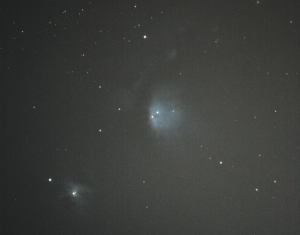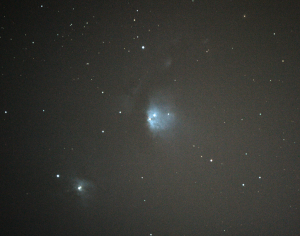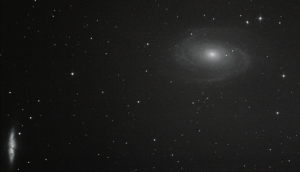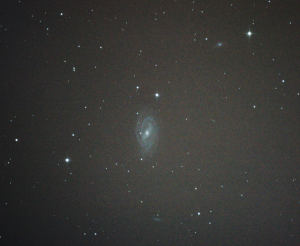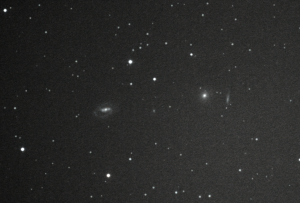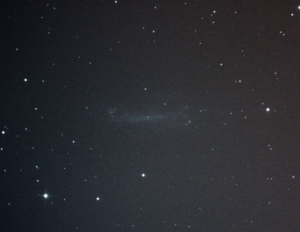It was clear last night with a breeze to start but that died out as the evening progressed. The moon is 25 days old so no problem from stray light although the forecast was for the possibility of rain in the early morning. For that reason I closed the roof at 1am although as it turns out the rain never came … better safe than sorry ![]()
I was able to get some more Galaxy shots but I think I should swap cameras if I’m going to aim for galaxies and keep the Canon 300D for the the wide nebula shots.
Talking of nebulae, I had a go at M78 and although its nothing like the ESO shot here I’m still happy with it ![]() This is a stack of 17 x 2 minutes but the short exposures have limited the detail although the dark dust cloud is clearly visible in front of the nebula.
This is a stack of 17 x 2 minutes but the short exposures have limited the detail although the dark dust cloud is clearly visible in front of the nebula.
This next image is 3 x 5 minutes and although not enough frames to reduce the SNR (Sigal to Noise) it’s clear that this object would benefit from longer exposures. (Maybe tonight if it’s clear)
I’m currently working through a tutorial on using a radial gradient to remove the effects of vignetting, but the tutorial is for Photoshop and I’m using GIMP. My main problem with GIMP is its inability to work with the 16bit TIFF files that are produced by Deep Sky Stacker.
So on to some Galaxies. Here’s one I seem to gravitate towards most nights – Galaxy M81 in Ursa Major. Galaxy M82 is in the bottom left corner. This image is a stack of the best 11 from 17 x 4 minute exposures with a dark frame applied.
Ursa Major is peppered with Galaxies, mostly too small for the Canon 300D so I only imaged those above and Galaxy M109 the barred spiral.
In the area surrounding Ursa Major there are many small galaxies but as I said earlier I should return here with the Atik 16ic rather than the Canon 300D. There are lots of small faint fuzzies in the original frame of this image but I cropped out the centre to keep the file size small enough to upload.
NGC4236 is described as a “Low Surface Brightness Spiral” which may account for this stack of 4 x 4 minute frames having very little detail.
| Mount: | EQ6 Pro |
|---|---|
| Telescope: | SkyWatcher 250 254mm aperture, 1200mm focal length |
| Camera: | Canon 300D (unmodified) |
| Mount COntrol: | EQMOD (eqascom) |
| Guide scope: | StarChaser 80 |
| Guide camera: | Atik 16ic mono |
| Guide Software: | PHD Guiding |
| Other Software: | Cartes Du Ciel Deep Sky Stacker GIMP image processing |
